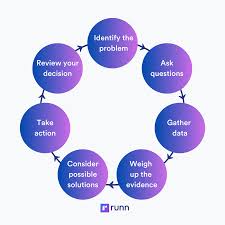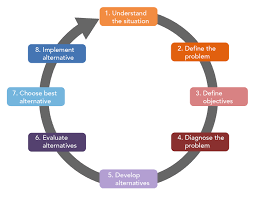6 Tips for Making Rational Decisions: From Identifying Goals to Being Flexible
- Identify your goal
- Gather information
- Analyze pros and cons
- Consider multiple perspectives
- Take your time
- Be flexible
Identify your goal
When it comes to making rational decisions, one of the most important tips is to identify your goal. Without a clear understanding of what you want to achieve, it can be difficult to make decisions that are in line with your overall objectives.
Identifying your goal is the first step in the decision-making process. This involves taking the time to think about what you want to achieve and why it’s important to you. For example, if you’re trying to decide whether or not to take a new job, your goal might be to find a position that offers better pay and benefits, or one that is more aligned with your career goals.
Once you have identified your goal, it’s important to consider all of the options available to you. This may involve researching different job opportunities, speaking with colleagues or mentors, or seeking out advice from experts in your field.
By taking the time to identify your goal and carefully consider all of your options, you can make rational decisions that are in line with your overall objectives. This can help ensure that you are making choices that will help you achieve success and reach your full potential.
In conclusion, identifying your goal is an essential step in making rational decisions. By taking the time to think about what you want to achieve and why it’s important, you can make informed choices that will help you achieve success both personally and professionally.
Gather information
When it comes to making rational decisions, one of the most important steps is to gather as much information as possible. This means taking the time to research and learn about the options available, weighing the pros and cons of each, and considering how each option may impact your life in both the short and long term.
Gathering information is crucial because it allows you to make informed decisions based on facts rather than assumptions or emotions. By taking the time to gather information, you can avoid making hasty decisions that may not be in your best interest.
One important thing to keep in mind when gathering information is to ensure that you are getting unbiased and accurate information. This means looking for sources that are reputable and trustworthy, such as academic journals or government websites.
Another important aspect of gathering information is being open-minded. It’s easy to fall into the trap of only seeking out information that supports our pre-existing beliefs or opinions. However, this can lead to a biased decision-making process. Instead, try to approach each option with an open mind and consider all of the available information before making a decision.
In conclusion, gathering information is an essential step in making rational decisions. By taking the time to research and consider all options objectively, you can make informed decisions that will benefit you in the long run.
Analyze pros and cons
When it comes to making decisions, it can be easy to get caught up in the moment and make a choice based on emotions rather than logic. However, taking a rational approach to decision making can often lead to better outcomes. One simple technique that can help you make more rational decisions is analyzing the pros and cons of each option.
Analyzing the pros and cons involves listing out all of the potential benefits and drawbacks of each option you are considering. This can help you gain a clearer understanding of the potential outcomes of each choice, as well as any risks or downsides that may come with them.
By taking the time to analyze the pros and cons of each option, you can weigh them against one another and make a more informed decision. This technique can also help you identify any biases or assumptions you may have about certain options, allowing you to make a more objective decision.
Of course, analyzing the pros and cons is not foolproof – there may be factors that are difficult to quantify or predict. However, by taking a rational approach and considering all of the available information, you will be better equipped to make a decision that aligns with your goals and values.
In summary, when faced with a difficult decision, take some time to analyze the pros and cons of each option. By doing so, you will be able to make a more informed decision that takes into account all of the available information.
Consider multiple perspectives
When it comes to making rational decisions, it’s important to consider multiple perspectives. This means taking the time to view a situation from different angles and considering how different people or groups might be affected by your decision.
By considering multiple perspectives, you can gain a more complete understanding of the situation and make a more informed decision. It can also help you identify potential risks or unintended consequences that you may not have otherwise considered.
For example, if you’re trying to decide whether or not to accept a job offer, it’s important to consider how the decision will affect not just yourself, but also your family, your current employer (if applicable), and any other stakeholders who may be impacted by your decision.
Taking the time to consider multiple perspectives can also help you avoid biases and assumptions that may cloud your judgment. It allows you to step back and look at the situation objectively, rather than simply relying on your own personal experiences or beliefs.
In short, considering multiple perspectives is an essential part of making rational decisions. It enables you to weigh all of the relevant factors and make a decision that is based on sound reasoning and thoughtful consideration. So next time you’re faced with an important decision, take some time to consider all of the different perspectives involved – it could make all the difference!
Take your time
When it comes to making important decisions, it’s easy to feel pressured into making a quick choice. However, taking your time can be a crucial step in making a rational decision.
Rushing into a decision can lead to regret and potentially negative consequences. It’s important to take the time to gather all the necessary information, weigh the pros and cons, and consider all possible outcomes. This can help you make a more informed decision that you’ll feel confident about in the long run.
Making a rational decision also means being aware of your emotions and biases. When we’re under pressure or stressed, our emotions can cloud our judgment and lead us to make impulsive choices. Taking your time allows you to step back and evaluate the situation objectively.
It’s also important to remember that not all decisions need to be made immediately. In fact, some decisions may benefit from taking some time to reflect or seek advice from others. Don’t be afraid to take the time you need in order to make the best decision possible.
In conclusion, taking your time is an essential part of making rational decisions. It allows you to gather information, consider all options and potential outcomes, evaluate your emotions and biases, and ultimately make an informed choice that you’ll feel confident about in the long run.
Be flexible
One of the most important tips for making rational decisions is to be flexible. While it’s important to have a clear idea of what you want and what your goals are, it’s equally important to be open to changing your mind if new information arises or circumstances change.
Being flexible means that you are willing to consider different options and approaches, even if they may not have been part of your initial plan. It means that you are willing to adapt and adjust your decision-making process as needed in order to achieve the best possible outcome.
When you approach decision-making with flexibility, you are able to consider a wider range of possibilities and weigh the pros and cons of each option more objectively. This can help you avoid getting stuck in a rigid mindset that may limit your ability to make the best decision for your situation.
Flexibility also allows you to be more resilient in the face of unexpected challenges or setbacks. When things don’t go according to plan, being flexible can help you adjust your approach and find alternative solutions.
In short, being flexible is an essential component of rational decision-making. By remaining open-minded and adaptable throughout the process, you can increase your chances of making a well-informed decision that leads to positive outcomes.




